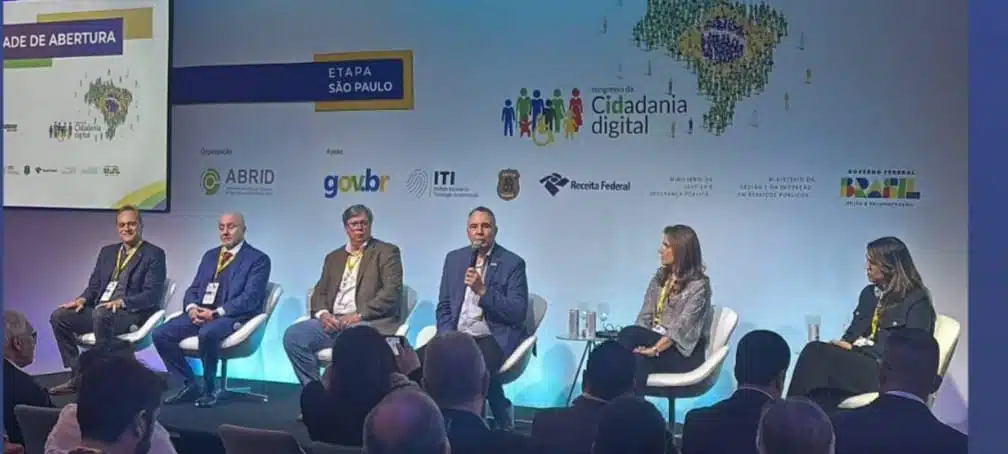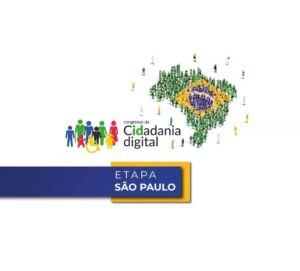The city of São Paulo hosted, on July 30, the preliminary stage of the Digital Citizenship Congress 2025, considered the most influential national meeting on civil identification, digital security, and public modernization policies.
Organized by ABRID (Brazilian Association of Technology Companies in Digital Identification), the event brought together public authorities, specialists, representatives of the digital certification industry, and sector executives to discuss the future of digital citizenship in Brazil.
Representing Minister Esther Dweck, head of the Ministry of Management and Innovation in Public Services, the Secretary for Digital Government at MGI, Rogério Mascarenhas, reinforced the national and transformative nature of the new National Identity Card (CIN):
 “I highlight the importance of the São Paulo Stage of the Digital Citizenship Congress. This is a project that relies on much dialogue, much communication, much transparency, and a lot of listening. The states are an integral part of this, and here we highlight the position of São Paulo.”
“I highlight the importance of the São Paulo Stage of the Digital Citizenship Congress. This is a project that relies on much dialogue, much communication, much transparency, and a lot of listening. The states are an integral part of this, and here we highlight the position of São Paulo.”
“São Paulo has reached the milestone of 4 million CINs issued. This is an important landmark. Today we already have 30 million CINs issued throughout Brazil. It is an extremely important citizenship project for our country. It is not a federal government, municipal, or state project. It is a project for the entire nation,” stressed Mascarenhas.
 “The São Paulo stage was the first step toward bringing identification issues closer to the states and regions of Brazil. We want to start as early as 2026 with regional stages, so we can be increasingly closer to the reality of each region of the country. On July 30 we had more than 350 guests and issued over 300 CINs in the polycarbonate card model, in this ‘pilot’ promoted by IIRGD. We focused on 4 panels that covered topics ranging from the very beginning of identification, with security ensured by neonatal and child biometrics, addressing the problem of missing persons which can be mitigated with the new identification process, reaching the main element which is the issuance of the CIN in Brazil and its current stage in the state of São Paulo, and concluding with what we are working on for the future, which is the major integration of all this through a Public Digital Infrastructure of Civil Identification. Now the focus is to concentrate efforts to showcase this and much more in September, on the 24th and 25th, in Brasília,” declared Célio Ribeiro, president of ABRID.
“The São Paulo stage was the first step toward bringing identification issues closer to the states and regions of Brazil. We want to start as early as 2026 with regional stages, so we can be increasingly closer to the reality of each region of the country. On July 30 we had more than 350 guests and issued over 300 CINs in the polycarbonate card model, in this ‘pilot’ promoted by IIRGD. We focused on 4 panels that covered topics ranging from the very beginning of identification, with security ensured by neonatal and child biometrics, addressing the problem of missing persons which can be mitigated with the new identification process, reaching the main element which is the issuance of the CIN in Brazil and its current stage in the state of São Paulo, and concluding with what we are working on for the future, which is the major integration of all this through a Public Digital Infrastructure of Civil Identification. Now the focus is to concentrate efforts to showcase this and much more in September, on the 24th and 25th, in Brasília,” declared Célio Ribeiro, president of ABRID.
At the São Paulo Stage of the Digital Citizenship Congress, four main topics were addressed:
Child Biometric Identification, The Issue of Missing Persons, National Identity Card (CIN), Public Digital Infrastructure
Child Biometric Identification
The Issue of Missing Persons
National Identity Card (CIN)
Event Program
Discussion Panels and Participants
Panel 1: Secure identification from birth – neonatal and child biometrics. Participants: Ana Estela Haddad, Dr. Pereira Lima, Eduardo Lacerda, Fernando Costa Azevedo, and Guilherme Graziani.
Panel 2: Identification as a tool to combat missing persons. Participants: Fernanda Baldo, Georghio Tomelin, Hudson Vinícius Mesquita, Marcelo Jacobucci, Tula Vieira Brasileiro, and Lílian Cintra de Melo.
Panel 3: Experience of issuing the CIN in SP and in Brazil. Participants: Antônio Maciel Aguiar Filho, Fernando Costa Azevedo, Rogério Souza Mascarenhas, Márcio Palaia Lazzari, and Maurício Coelho.
Panel 4: Combating financial fraud through the Public Digital Infrastructure of Civil Identification (DPI-CI). Participants: Célio Ribeiro, Fernanda Garibaldi, Hudson Vinícius Mesquita, Rogério Souza Mascarenhas, and Walter Faria.
Digital Citizenship Congress
The Digital Citizenship Congress is the main forum for debate on civil identification in Brazil. The event is organized by the Brazilian Association of Technology Companies in Digital Identification (ABRID), with the support of MGI and other public and private institutions.
The full 2025 edition of the congress will take place in Brasília (Federal District), from September 23 to 25. This year, the central theme will be “National Integration.” Registration is free and can be made through the official event website: https://congressodacidadaniadigital.iti.gov.br/2025/





